| Number 51, Summer 2011 | 25.360 copies |
JUNE: GAUDI'S MONTH
With the coincidence of two memorable dates, the birth and death of Gaudí, with a difference of 74 years between them but both within the same month, June is undoubtedly Gaudi’s month. We invite all our members and friends of Gaudí to celebrate it in one way or another.
SUMARIO
1. GAUDÍ’S BIRTHDAY PARTY
 |
For the celebration of his anniversary we call upon all members of the GaudiClub to celebrate this together by raising a glass of cava at midnight on the 24th and eating a slice of spinach “coca” pastry while we say “HAPPY BIRTHDAY GAUDÍ" from the bottom of our hearts.
Two important events take place in the month of June. The anniversary of the birth of Gaudí on the 25th of June, 1852, at 9.30h in the morning he was born in Camp de Tarragona, some say in Reus, others in Riudoms and there are those who say he was born in Reusdoms.
Almost 75 years later, on the 10th of June, 1926, he died the victim of a traffic accident caused by a route 30 streetcar at the crossroads of Bailén and Gran Vía
|
- LA VERBENA DE SAN JUAN (THE NOCTURNAL FESTIVAL OF SAN JUAN)
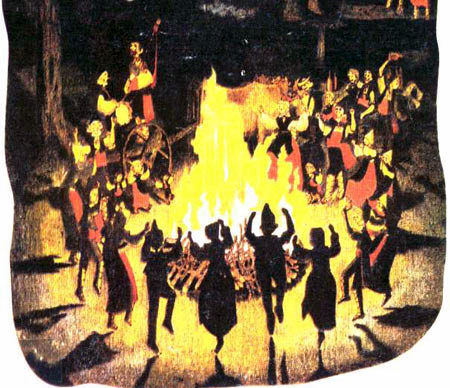
La Verbena de San Juan
It is a deep-rooted tradition in many places to celebrate the arrival of the summer solstice around purifying bonfires and the anniversary of the birth of San Juan Bautista (St John the Baptist) who was born on the 24th of June, is also celebrated. Take note that the celebrations will be held on the night of the 23rd to 24th of June, although in reality the shortest night corresponds with the summer solstice, on the 21st of June.
In the majority of places this celebration consists in burning furniture and old junk in the street that the children of the houses collect a few days before and save in order to build a great bonfire on this special night.
IN ANCIENT TIMES, the arrival of the summer solstice was a negative sign. The fact that from that moment onwards the days got shorter and shorter and darkness gained ground over light was not interpreted positively. This is why a series of rites were performed for the purposes of negating this detrimental effect. One of the ancient pagan sun rites consisted in the preparation of some “cocas” (pastries), rounded in shape to symbolise the solar disc, which were then eaten soaked in sweet wine.
The Romans sallied out on that night to gather verbena – a shrub-like plant from the same family as lemon verbena – with which they adorned their houses and gardens, considering it to be a lucky plant. This is the origin of the celebration’s name, the origin of the paper strings and little coloured lamps with which we adorn the celebration venues.
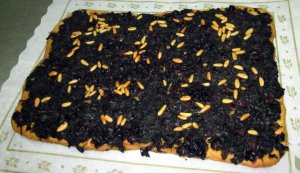
Spinach "coca" pastry |
Ingredients:
For the dough:
- 1 kg of strong flour
- 150 grams of pork lard
- 30 grams of baker's yeast
- 1/4 litre of water
- Salt
For the filling
- 1kg of Raw Spinach
- 100gr of Pine Nuts
- 2 Cloves of Garlic
- Olive Oil
- Salt
|
|
Preparation:
We dissolve the yeast in tepid water, add the lard and the flour little by little, work the dough, cover it with a cloth and leave to rest for 30 minutes, whereupon we knead it once again and leave the dough covered for a further 30 minutes.
In the meantime, we lightly cook the spinach in boiling salted water for 10 minutes. Then drain well and sauté in the olive oil in which we have already fried the garlic and add the pine nuts for them to also sauté.
We then lay out the dough on the baking tray which we have greased with oil. We spread the spinach and pine nuts evenly over the dough and bake it for 20 minutes at 180 degrees. Remove the “coca” and, if crispy, it is now ready.
| 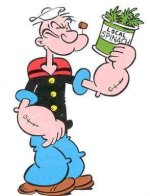 |

2. Anton Gaudí and Eusebi Güell
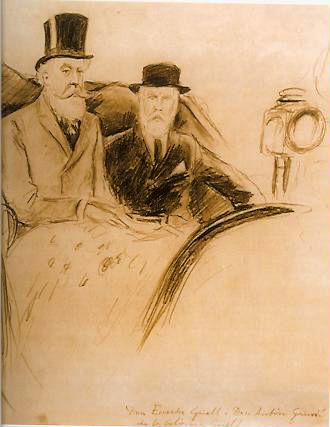
This is one of the few images preserved of Anton Gaudí and Eusebi Güell, whose special friendship led to the construction of many of the works authored by Gaudí, as Eusebi Güell was the patron who financed his work.
It is a hitherto unpublished image that we herewith provide for the enjoyment of our members.

3. GAUDÍ’S TRAMCAR ASSASSIN
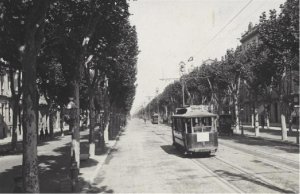
Some 125 years after the arrival of the tramcar in Barcelona, a report looked back on some of the memorable moments of a means of transport that initially was not within reach of all pockets: for many it became a luxury to be enjoyed on a Sunday. In 1951 an exaggerated increase in prices led to its boycott by the people of Barcelona. And a decade later the fleet was modernised with some vehicles brought over from Washington. The tramcar was also guilty of the death of one of the greatest architects the world had ever seen: Antonio Gaudí. On the 10th of June of 1926 the creator of La Sagrada Familia and La Pedrera died after being knocked over by a tramcar. Indeed, the story goes on: very few actually tried to help the famous architect.
Judicial enquiry into the accident
It has been said that the Indictment on the death of Gaudí in 1926 has been sought in the archives of the law courts basement. Well, in the archives of the Royal Gaudí Chair the following text can be seen which clarifies much in relation to the location of the afore-mentioned Indictment. The documents says:
"The Court of First Instance in the District of the Hearing published the following summons:
On the merits of Indictment Nº 339 of 1926 in relation to the injuries and subsequent death of Mr. Antonio Gaudí Cornet from having been knocked down by a tramcar or automobile in the afternoon of the 7th on Calle de las Cortes, we hereby summon those individuals who may provide depositions in relation to the event in order that they may appear before this Court and secretariat of Mr. Casanovas.
Barcelona, 11th of June of 1926
The Secretary:
P.H. Ricardo Alemany"
So therefore we must try to locate Indictment number 339 from 1926 which contains the summons referred to and which may contain the statements of the witnesses who could attest to what happened at five o’clock in the afternoon on the 7th of June of 1926 on Granvía and calle Gerona. It should be noted that the supposition that an automobile was involved is completely gratuitous as it was a tramcar from route 30, also known as the red cross, which ran into and injured Gaudí.
If this indictment is ever found, in a cupboard in the basement of the law courts, it is possible that it may contain more precise information about the unfortunate accident that cost the great architect his life shortly after turning 74 years of age.
Circumstances of his death
Gaudí was a man who made do with very little and dressed somewhat carelessly; so much so that the day of the accident with the tramcar, no-one recognised him on the ground. On the seventh of June he was run over by a route 30 tramcar on the junction of calles Bailén and Gran Vía, and the taxi drivers refused to take such a poor vagabond to the hospital (subsequently, the municipal police fined them for not helping an injured person). He never sought contact with journalists and fled from the cameras, this is why there are very few photographs of the architect.
This change of attitude may have been due to a series of events that took place from 1912 onwards. During that year his niece, Rosa Egea, died who lived with him in Barcelona. In 1914 his faithful collaborator, Francesc Berenguer Mestres, died, and due to questions relating to professional fees he legally challenged the Milà family. In 1915 the continuity of the work at La Sagrada Familia was endangered due to a serious economic crisis. In 1914 he saw how work on the Colonia Güell were definitively brought to a halt and two years later his friend, the archbishop of Vic, Doctor Torras y Bages died; and in 1918 his best friend and patron, Eusebi Güell, also died. They are sad events, all of which affected him, but did not deprive him of the energy and enthusiasm to see how his greatest work, La Sagrada Familia, grew.
Gaudí died at the age of 74 (10th of June 1926), but if it had not been for the tramcar he might have lived many more years as his father lived until the age of 93, preserving all of his energy along the way. Half of Barcelona dressed in mourning as a last honour to a man who, despite very few of them knowing him in person, had become very popular. His body was buried in the crypt of the building he had worked on for the last almost 43 years of his life, la Sagrada Família.

4. MOSAICS WORKSHOP
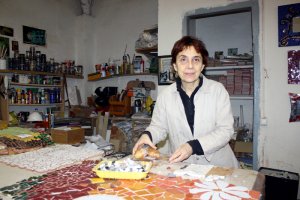 The artist Livia creating in her workshop. Our member Livia Garreta, mosaics teacher and artist renowned for the creation of numerous mosaic works throughout the country now provides the opportunity of visiting her workshop or also of participating in diverse mosaics courses throughout the year. To do so you need simply contact her at her email address mosaics@liviagarreta.com to arrange a day and time for the visit.
It is a very educational visit which teaches you how to better know the work of Gaudí in all its smallest details. You will undoubtedly enjoy it. Sign up now!

5. FIRE AT THE SAGRADA FAMILIA
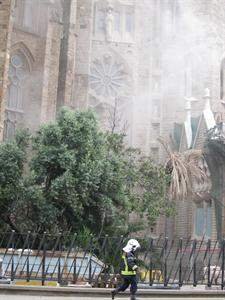
Wednesday, 20 de April of 2011
A victimless fire at the Sagrada Familia could have been much worse in one of most tense days in recent years. A little after 10:30 in the morning, a 65 year old man, José María L.S., carrying a number of lighters and an oil spray, entered the Naixement vestry of the crypt in which the remains of Gaudí lie.
The terrible smoke produces required the evacuation of 1500 tourists who had been inside at the time and led to the closure of the basilica.
The man was arrested and the basilica reopened later that afternoon as if nothing had happened.
The damage was not extensive but according to the management of the Sagrada Familia this incident will oblige them to take another look at the question of security.
Undoubtedly for one reason or another, the Sagrada Familia will always be in the limelight

6. COLLABORATIONS OF OUR MEMBERS
Our member Marlo Bartels from Laguna Canyon Road in California is a renowned artist with Gaudinian tendencies. This is why we herewith reproduce a series of works inspired by the famous architect Antonio Gaudí for the admiration of all those who share such artistic tendencies inspired by Gaudí.
For more information send us an email to gaudi@gaudiclub.com

7. OUR ONLINE SHOP
¿Not find what you were looking for? Check our index by price .

We await your news, letters, essays, photos... Come on and participate!
Your comments and suggestions to gaudi@gaudiclub.com
Gaudinian greetings from Barcelona, thank you for continuing with us and until the next newsletter.
If you are a member and you cannot remember your identification number and password, send us an email to: info@gaudiclub.com
ASOCIACIÓN GAUDI & BARCELONA CLUB
Riera Sant Miquel, 16 3r.
08006 Barcelona
Telfs: +34 93 415 25 66
Fax: +34 93 415 30 33
http://www.gaudiclub.com
e-mail: gaudi@gaudiclub.com
|